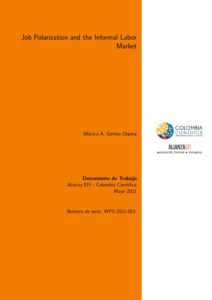This paper analyses the incidence of job polarization in developing and emerging countries, where a substantial fraction of the urban labor force works in the informal sector. I build a general equilibrium model with informality and endogenous occupational choice. Workers in the informal sector do not pay taxes, are less productive, and have the same ability to perform manual tasks. The analytical solution of the model shows that job polarization, driven by a Routine-Biased Technological Change (RBTC), could lead to a decrease in the share of employment in the informal sector and a reduction in the wage inequality at the bottom of the skill distribution
Autores:
- Monica A. Gomez Ospina
Palabras clave:
- Informal
- Polarization urban labor
Categorías:
- Proyecto 5
- Documentos de trabajo
